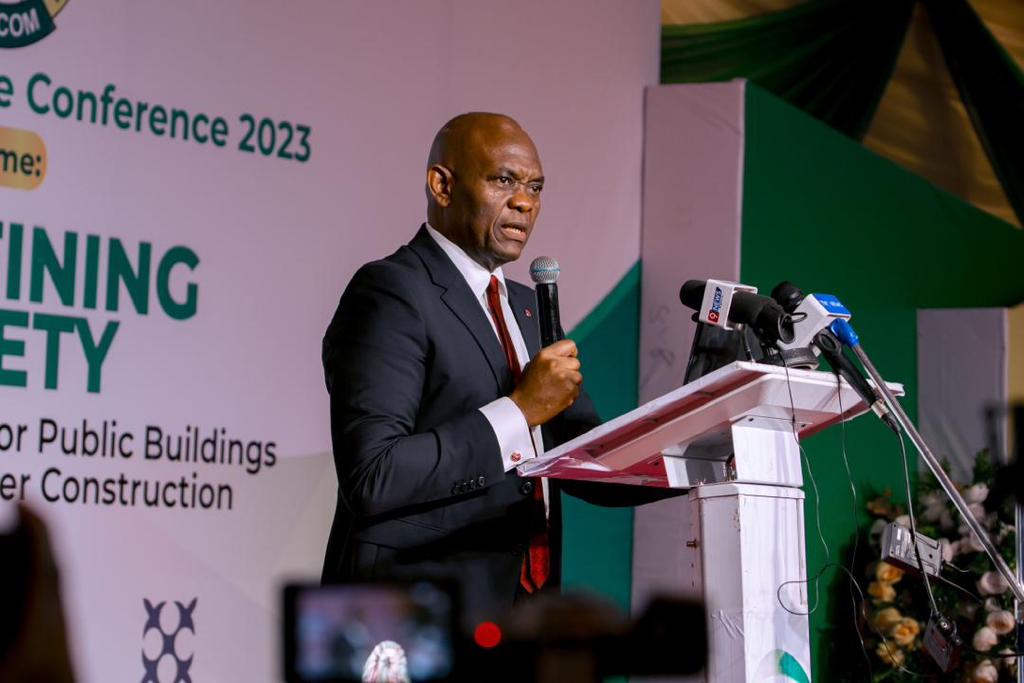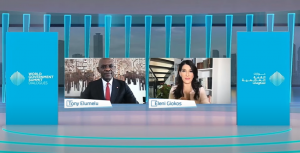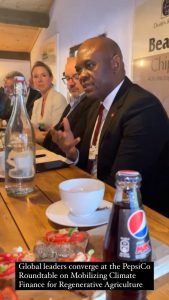
- First, let me extend my sincere appreciation to NAICOM for inviting me to address this most distinguished gathering as the theme speaker of this year’s NAICOM Annual Conference.
- Annual industry convenings such as this are an important avenue for all stakeholders to discuss and dimension the critical issues affecting our industry and position it for sustained growth.
- They provide an opportunity for practitioners and regulators to come together and have frank discussions on the state of the industry and agree the course to a sustainable, ethical, professional industry – and chart the course to a significant increase in the insurance penetration in our Country.
- Our insurance industry is one that requires significant transformation.
- Insurance should be a national good, a roof for our people, a foundation for our infrastructure.
- A vibrant industry supports businesses, enables savings, and supports investment. It trains our youth, formalises our economy, generates tax revenue.
- And yet the contribution of the insurance sector to our nation’s GDP stands at less than 1% (Agusto & Co).
- This is worrying, Nigeria is a country of 200 million people, who all need insurance products, whether for health, protecting lives and livelihoods or savings.
- Insurance has a strategic role in our country’s future and development. A healthy, trusted, and innovative insurance sector should be the mechanism for creating savings and channelling these savings into the infrastructure investments our country needs.
- We are all gathered here today because we know that the Insurance sector in Nigeria has huge potential for our country’s economic transformation.
- We must leave this Conference with concrete actions that will bring us closer to the transformation of the insurance industry and ensure it plays its role in Nigeria’s development.
- When President Bola Ahmed Tinubu addressed a group of Nigerian and US private sector leaders at the NASDAQ last month, during the United Nations General Assembly, he spoke about the need to increase consumer credit to boost consumption and stimulate economic growth.
- A vibrant insurance industry has a critical role to play.
- I stand before you all today as someone who has invested across sectors of the Nigerian and African economies.
- Through the Heirs Holdings Group, which I founded, we have investments in Financial Services, Power, Energy, Real Estate, Hospitality, Healthcare and Technology in Nigeria and across Africa.
- We operate in 24 countries in Africa and across four continents globally.
- Our vision is driven by my philosophy of Africapitalism.
- For us it is about doing well and doing good simultaneously.
- Creating economic wealth is good and we aim to do that in our investments and at the same time, we also aim to create social good.
- This philosophy of Africapitalism guides our investment strategy across our Group and we invest long-term in sectors that are most strategic and can catalyse economic growth and create social wealth for the communities and countries we operate in.
- This is why we invested in the Insurance sector.
- We ventured into the Insurance space in 2021, because we saw the opportunity to significantly contribute to the transformation of the sector and I must say that it has been exciting to see our Heirs Insurance Group quickly become the fastest growing insurance Groups in Nigeria.
- But there is more to do. Insurance in Nigeria needs to play the kind of role it plays in mobilising investments and protecting lives in other countries such as the USA, UK, Netherlands, and closer to home in South Africa, Ghana, and Kenya.
- I have been invited here to speak on Redefining Safety: Insurance Solutions for Public Buildings and Buildings under Construction.
- Like many of the people in this room, I woke up one morning last year to the news of the unfortunate incident that happened in Ikoyi, Lagos, where a building still under construction collapsed, killing many people, including the promoter of that project.
- That is just one of the many tragedies of building collapses that occur in Nigeria.
- According to the Building Collapse Prevention Guild (BCPG), over the past 49 years, our country has recorded 533 building collapses.
- That is an average of 11 such tragedies per year.
- In 2019 alone, there were 43 RECORDED building collapses.
- And these building collapses wreak havoc on Nigerians, with lives lost.
- A further estimated 36,000 buildings face impending collapse in the country.
- There is a role for insurance, but there are roles for professional associations such as:
- The Council for the Regulation of Engineering in Nigeria (COREN)
- The Nigerian Institute of Estate Surveyors and Valuers (NIESV)
- The Nigerian Society of Engineers (NSE)
- So, this is a problem that requires a multi sectoral approach to holistically deal with the root cause of building collapses in Nigeria.
The Insurance Act.
- Sections 64 and 65 of the Insurance Act 2003 specify that no person shall construct any building of more than two floors without insuring with a registered insurer.
- This Act further states that the duty to insure shall arise when a building is under construction.
- These provisions of the law provoke the following questions:
- How many of the public buildings in Nigeria are insured as mandated by the Act?
- What is the compliance level to the laws?
- Who is monitoring compliance?
- Are there punitive actions for non-compliance?
- What is the awareness level for the provisions of the law on the insurance of public buildings?
- Does a database for claims settlement exist?
- How well does the insurance industry understand its role on the insurance of public buildings?
- Nigeria needs to build – Nigeria needs ports, roads, power stations, we need schools and hospitals, our people need homes. But this cannot happen if building codes, and legislation are flouted. Insurance should be as central to our construction industry, as the concrete that binds our buildings.
- Insurance Penetration
- Let us examine why the building sector epitomises the broader ills of our industry.
- Simply, we have a poor insurance culture and low insurance penetration in Nigeria.
- Why is this:
- Poor legislation that does not allow proper enforcement of insurance laws, including enforcement of compulsory insurance.
- Inefficient Insurance processes especially around settlement of claims which fosters the public’s lack of confidence and trust in insurers.
- Insurance regulatory framework.
- The mindset of insurance practitioners in Nigeria.
- Poor capitalisation requirements in the insurance.
- Legislation
Let us look at the legislation that governs our industry:
- The Insurance Act of 2003 needs to be overhauled – I understand NAICOM is already spearheading this initiative.
- We need to pass the bill and ensure that the new act can drive the IMPLEMENTATION and ENFORCEMENT of Compulsory Insurance in Nigeria.
- This will result in increased insurance penetration.
- We need stronger punitive enforcement measures for people that avoid contractors’ insurance in construction to ensure that due process is followed and in the event of any unforeseen incidents, insurance is there to act as a risk mitigant.
- NAICOM must work with relevant government bodies to ensure compliance and enforcement of the provisions of the laws governing insurance.
- Claims Settlements
Claims Settlement
- The insurance industry still has manual, inefficient processes, especially around critical issues such as claims payments.
- Insurance companies in the US and Europe can pay out claims in minutes with little human intervention. We should aim for no less! This is my charge to practitioners in the room here today.
- How do you instil public confidence in the insurance sector, if the impression is that insurers do not pay claims on time?
- Or that claims payments turn into a back-and-forth onerous conversation between customer and insurance company.
- Unprofessionalism must be excised, and we must bring discipline to the sector.
- Regulation
- Our mantra going forward must be that everything under insurance should be less onerous – for our customers and for practitioners.
- We cannot stifle creativity at a time where there is already a strong cultural bias against the concept of insurance.
- Why is the regulator of a sector as strategic as insurance involved in the regulation of social media posts, that seek to create awareness of insurance products.
- We must encourage Nationwide Insurance Awareness campaigns.
- We need to make Insurance a lifestyle by continuously enlightening Nigerians on its numerous benefits.
- NAICOM should work with Insurance companies to run continuous insurance campaigns nationwide in local languages that resonate with the people.
- All insurers should contribute part of their annual profit before tax to help create national awareness about insurance.
- We must take Insurance to the young people.
- At the Tony Elumelu Foundation, we have funded 18,500 young entrepreneurs from every country across Africa. Their pain points other than access to finance, training, and mentorship, is around a lack of adequate insurance knowledge and products that caters to their unique needs. We must be more creative if we are to serve Nigeria’s young people adequately.
The Mindset of Insurance Practitioners in Nigeria.
- Insurance sector practitioners must act in a way and manner that this profession is one that people aspire to become part of.
- We need a mindset change in the industry. We need to increase the capacity in the sector.
- We need a younger and more agile workforce. We have so many young people, but the insurance sector is not attractive to them in the way banking, oil and gas, fast moving consumer goods, IT/Technology, creative areas like Nollywood etc and other sectors are.
- I chose my career in banking largely because of the professionals I saw in banking when I was growing up and I aspired to be like one of them.
- It is time to refresh the workforce mix in this sector.
- We need to attract the youth of our country into the sector.
- They have the energy, ideas, and the creativity to take the industry to the next level. See what has happened in the banking, telco, creative sectors of our economy. These can also be replicated in the in the insurance sector.
Recapitilisation of the Insurance Sector.
- Today, capital requirements are set at 8bn for Life insurance and 10 billion for general insurance.
- With the devaluation of the currency, you are talking about USD 8 million, USD10 million capital requirements for an insurance company in Africa’s largest economy.
- How can an industry intended to ‘insure’ and mitigate the risks associated with economic growth of a country have such low capital requirements.
- Let me be clear, recapitalisation is not about increasing the barriers to entry into the industry. Gatekeeping is not the objective here.
- But we must ensure that the sector has the financial muscle and backbone to handle more complex insurance transactions whilst extending reach.
- That is the only way the industry can scale and expand operations out of Nigeria and into Africa!
Conclusion.
- As I conclude, let me reiterate my firm belief in the strategic role of Nigeria’s insurance sector.
- The reasons we are failing to enforce the insurance of public buildings in Nigeria is indicative of much wider issues within the insurance industry.
- Why is it that Nigeria has built a banking sector that operates across Africa, why is it that UBA can operate in New York, in Dubai, in London, in Paris? Why is it that our insurance sectors is woefully behind, undersourced and undercapitalised?
- Our people have access to digital banking, I helped democratize banking, why are we not democratizing insurance?
- In two short years Heirs Insurance Group has grown exponentially, but we scratch the surface – I want to see our sector grow in the same way. I embrace competition, but I know if we, the government, regulators and industry players work together, we can create an enormous market that serves the greater good.
- Consequently, I propose as follows:
- We should increase the capital base of Insurance Companies to
N20Billion for Life andN30Billion for Non-life respectively.
- Review the dichotomy in Insurance authorisations/licences between life and non-life. Consolidated operators should have
N50Billion. Let us use regulation to shape behaviour and enforce compliance.
- NAICOM should focus on substance and things that will shape the sector and stop approving adverts. Use that time for more important aspects of regulation and save taxpayers money for more catalytic actions.
- All insurers should mandatorily contribute 0.5% of total revenue to drive industry awareness for 5 years. NIA should administer this professionally.
- Insurance Brokers capital base should be increased to
N1Billion.
- NAICOM should allow brilliant minds to come into the insurance sector and limit years of experience only to technical areas. Let us open the insurance sector in Nigeria to our young and innovative minds.
- With the right enabling environment, we will see the transformation of the Nigerian insurance sector.
- Let me emphasize that our regulators and the government have a critical role to play in making insurance a common right of every Nigerian citizen.
- It is embarrassing that Nigeria has less than 2% insurance penetration, in a nation of over 200 million people, struggling to survive, amidst the harshest economic realities.
- In a society where people are not insured, they are exposed to financial uncertainties that not only affect them, but their families and communities.
- It is a huge break on our common growth, Ladies and Gentlemen.
- Thus, we must re-assess and eliminate the stifling policies, roadblocks, and complacency in the insurance system, to encourage innovation and provide our people with simple and accessible insurance, not as an option, but as a fundamental right to secure their future. All within a regulatory framework that serves both clients and grows our industry.
- Thank you.
Tony O. Elumelu, CFR



